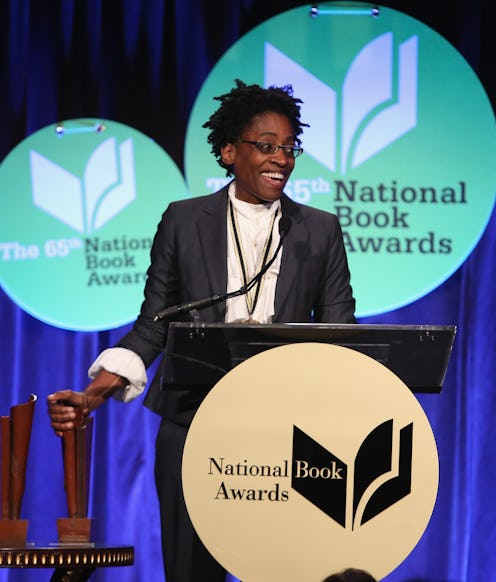Books
Jacqueline Woodson Responds To NBA Racist Joke
When Daniel Handler made a racist joke about Jacqueline Woodson while hosting the 2014 National Book Awards, the literary community was understandably upset, expressing their discontentment with Handler's conduct. But by far the most powerful, impactful, and important reaction to the incident comes from the author herself. In Jacqueline Woodson's New York Times op-ed, published Friday, Woodson responds with all the insightful analysis and grace that one would expect from the author of the National Book Award-winning Brown Girl Dreaming .
In "The Pain of the Watermelon Joke," Woodson begins by explaining her childhood relationship with watermelon and the allergy she developed to the fruit at age 11, which served as the basis for Handler's joke. She makes it clear that the joke was not just in poor taste — it taps into along history of racist stereotypes and jokes about watermelon. Growing up, Woodson writes, she came to understand "[in] the eyes of those who told and repeated the jokes [about watermelon], we were shuffling, googly-eyed and lesser than." It was categorically something that should not have come up at the National Book Awards.
At a time when the publishing industry is finally, slowly, being compelled to face up to its massive diversity problems, tainting the victory of an author of color, an author who had penned a book about black identity and black history no less, is the last thing anyone needed. "In a few short words," Woodson writes of the joke, "the audience and I were asked to take a step back from everything I’ve ever written, a step back from the power and meaning of the National Book Award, lest we forget, lest I forget, where I came from."
And that is very much not OK.
Woodson makes it clear that she and Daniel Handler have been "friends for years" and that in fact he knew of her watermelon allergy because of a visit she had made to his house. But although she does not demonize Handler, she also does not exonerate him, or excuse what he did. (She also does not reference the money Handler raised for the We Need Diverse Books campaign as part of his public apology.) Instead, her focus is on the joke itself, the context in which is was told, and its place in the context of American history — and the American present.
The essay as a whole demonstrates considerable grace on Woodson's part as she confronts something painful and hurtful and ultimately reaffirms her admirable determination "[to] give young people — and all people — a sense of this country’s brilliant and brutal history, so that no one ever thinks they can walk onto a stage one evening and laugh at another’s too often painful past."
Here's hoping that one day that is, indeed, the world we live in.
You can (and very much should) read Woodson's full essay here.
